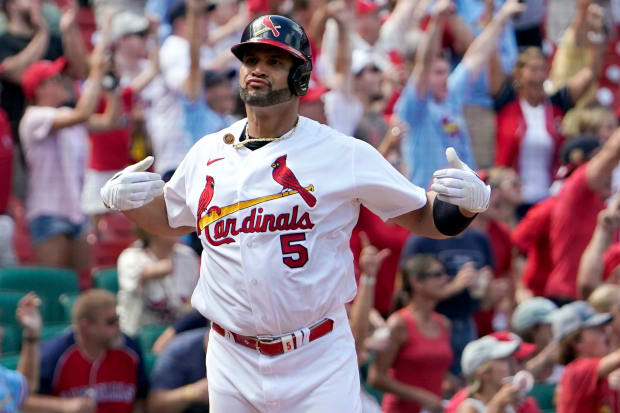On July 18, Albert Pujols entered Dodger Stadium with a big night ahead of him. He was in Los Angeles as a Home Run Derby participant, a legacy All-Star selection and, at the time, a .215 hitter for the year. His surprise run to the semifinals of the derby after beating Kyle Schwarber in a swing-off was a perfect note to highlight the midpoint of a swan song season, one that didn’t seem likely to feature many more moments of the 42-year-old stealing the spotlight.
Six weeks later, all of that has changed.
Pujols has not only turned his season around for the Cardinals, but he’s morphed into one of the league’s most productive hitters for a title-contending team seemingly overnight. In the process, he’s making history at the end of a career full of historic accomplishments as one of the best seasoned sluggers the league has ever seen.
Since July 10—a span consisting of 103 plate appearances—Pujols has raised his season OPS from .624 to .882, a white-hot streak in which he’s hitting an absurd .383/.437/.798. His surge continued in Monday night’s 13–4 win over the Reds, when he went 2-for-4 with a home run, the 694th of his career. The homer came off Ross Detwiler, a 36-year-old St. Louis native who became the 450th pitcher against whom Pujols has gone yard, a major league record. Not since the Obama Administration has Pujols been this hot, when he hit .352/.424/.864 with 14 home runs over a 24-game period from May 29 to June 23, 2015.
For the season, Pujols is now hitting .277/.351/.532 in 251 plate appearances. Based on OPS+ (which adjusts for a batter’s environment, both in terms of ballpark and era) he’s having the second-best hitting season ever for a player of his age (42), and the seventh best of the 40-and-over club, in MLB history, joining an elite group of names that includes four Hall of Famers and Barry Bonds (twice):
Among hitters with as many plate appearances this year, Pujols has been the seventh-best hitter in the National League based on OPS+ (151). That puts him ahead of guys like Mookie Betts (147), Pete Alonso (144) and Trea Turner (131). Pujols is working in a smaller sample size, sure—and he probably wouldn’t be performing as well if he weren’t playing primarily as a platoon player vs. lefties—but, for the sake of this exercise, let’s extrapolate his counting stats over a full season. Across 600 plate appearances, he is on pace for 35 home runs, 95 RBIs and 3.1 bWAR for the year. That type of production is incredible not just because of Pujols’s advanced age, but for how long it’s been since he’s resembled anything close to a league-average hitter.
The last time Pujols ended a season with an OPS+ above league average (100) was in 2016, when he put up a 113 mark over 650 plate appearances. From ’17 to ’21, he posted a .241/.290/.410 slash line with an 87 OPS+, eventually leading to his release from the Angels last May. Even though his stint with the Dodgers was subsequently viewed as a moderate success story, he still was only able to manage a 99 OPS+—though he did much better against lefties, which is ostensibly what he was brought there to do. He’s taken the mantle of lefty killer to another level this season. In 106 plate appearances against southpaws, Pujols owns a 1.231 OPS, second best in the NL behind only his teammate, Paul Goldschmidt (1.333).
Watch the Cardinals live with fuboTV: Start your free trial today.
So what’s behind this Pujols Renaissance? The answer lies in his ability to punish breaking balls from left-handed pitchers. Pujols hit a ghastly .108 on breaking balls from lefties in 2021 and .118 in ’20. From ’17 to ’21, he had a sub-.200 mark on these pitch types in four out of five seasons. This year, it’s been a different story, as Pujols is batting .375 with a .750 slugging percentage against lefty breaking balls. His .485 wOBA against left-handed breaking pitches is his best mark since ’10, according to Statcast, which was his last All-Star season with the Cardinals before this year.

AP Photo/Jeff Roberson
Aging is hard. No matter our occupation or stage in life, we all inevitably experience symptoms of slowing down as we get older. For a while, Pujols was the embodiment of aging in the form of a baseball player: occasionally reminding us of when he was so great, but more often than not resembling a slower, less potent shell of his former self. Athletes rarely get to go out on their own terms, and when the Angels released him, it looked as though Pujols wouldn’t get to do so, either. His five months with the Dodgers showed he still had something to offer, but there was no guarantee he would get another shot. He signed with the Cardinals in late March and had only a few games of spring training before the season started. A return to St. Louis seemed like the best-case scenario for his final season. It would give fans the welcomed sight of him back in a Cardinals uniform, even if he struggled.
Now, the narrative has shifted. His Cooperstown story was already solidified, but the final chapter was not yet written. By turning back the clock, he’s enjoying an ending that’s far more befitting a player of his stature. Over the next five weeks, Pujols will be chasing one last major milestone. He is just six home runs away from reaching 700 for his career, and if he keeps up his second-half pace, he’ll get there in time. With the postseason just around the corner—and thus, the chance at nailing an encore for the ages—his timing couldn’t be better.







